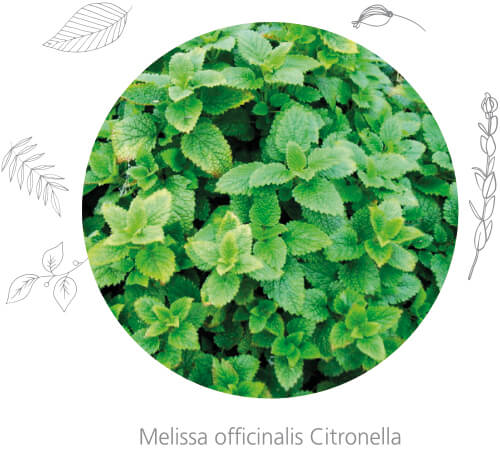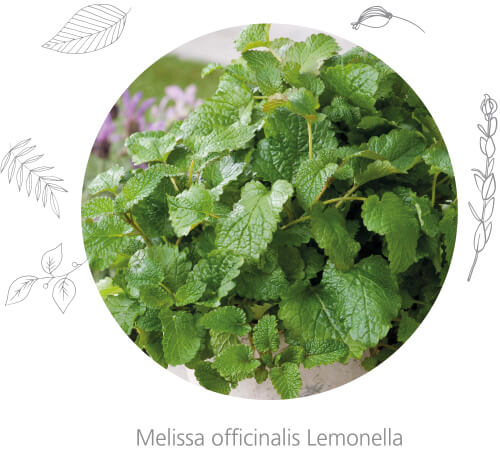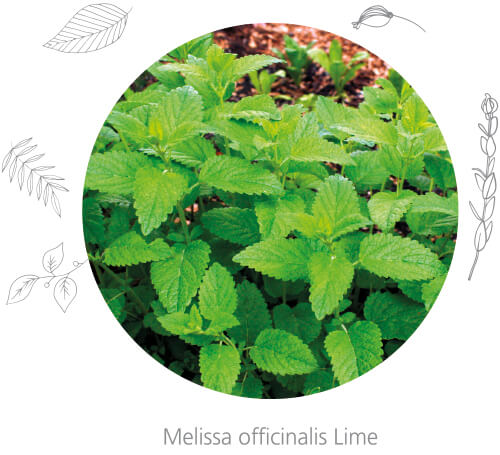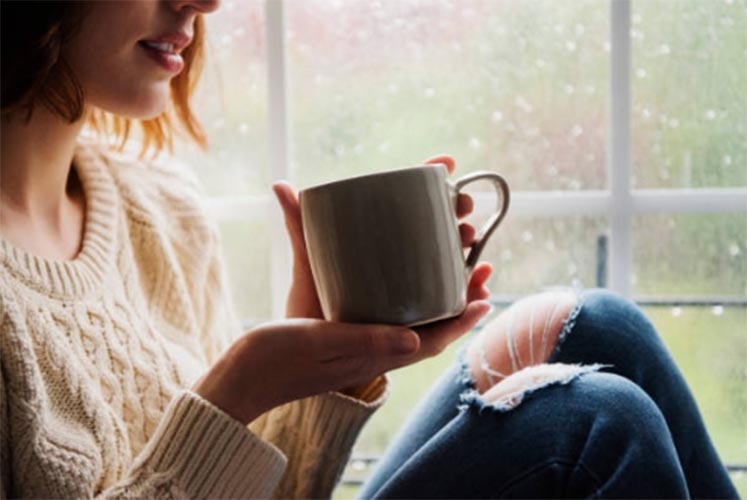-
Free Shipping in Greece over €30!

-
Shipping within 24 hours!

-
Worldwide shipping!



LEMON BALM
Lemon balm (Melissa) is an herb known since the ancient times for its relaxing and anti-stress qualities. It is cited by Dioksourides and Theofrastos. There are seven species in Greece.
Names - Species
The Latin name of the herb is Melissa officinalis (pharmaceutical Melissa). Other names are: wild-bee, melissa-grass, Melissa-herb, citronelle, citrus balm. Parakelsos called it "an elixir of life," and in 1679 Evelin wrote that melissa is a diamond for the brain, strengthens memory and drastically relieves the melancholy.
The main varieties of Malissa are: M. officinalis «Citronella», M. officinalis «Lemonella», M. officinalis «Quedlinburger», M. officinalis «Lime», M. officinalis «Variegata», M. officinalis "Aurea"

Botanical Description
Melissa is a perennial plant belonging to the Lamiaceae family. Its height varies from 70 to 150 centimeters. The stems grow upright, they are branched and hairy. Leaves are up to 9 cm, slightly hairy, oval in shape, jagged, with blunt or heart shaped base. There are vertebrae with jagged flowers with short stem, one flower facing the other; the stems are covered with glandular hair, yellowish, turned into white or pink when ripe. The roots of the plant are fibrous, filamentous and round. The leaves have a mild lemon peel scent associated with peppermint. The white flowers attract the bees, hence the name of the genus "Melissa" (bee).
Melissa blossoms from June to August. For therapeutic purposes, the leaves are carefully harvested before flowering. The harvesting takes place from the end of May to the beginning of June and from the end of July until the beginning of December.

History
Melissa officinalis is Dioskourides’ Melittis. It may be the "Melissa-leaf” referred by Theophrastos. In the ancient times it was considered as the elixir of youth and was used by priests for similar preparations. It was dedicated to the goddess Artemis. Its aromatic and medicinal properties have been known since the ancient times, as Theophrastos and Dioskourides inform us, who used it as a medicine for scorpion bites and as a menopause medicine.
For more than 2000 years, Melissa was a precious ingredient of many elixirs of life, and was particularly used by Avicenna, an Arab doctor of the 11th century. For centuries it has been popular as an effective remedy for melancholy, lethargy, memory, but also as an aid to restoring youthful vitality.

Pharmacological Properties
The most well-known and scientifically established pharmacological property of Lemon Balm is its anti-stress action.
Lemon balm leaves extract acts on the central nervous system diminishing anxiety, insomnia and several sleep disorders. The mechanism of action is the inhibition of the GABA-T (Gamma Amino Butyric Acid Transaminase), an enzyme target in the therapy of anxiety, epilepsy and related neurological disorders. GABA-T hydrolyses glutamic acid an amino acid (neurotransmitter) responsible for the normal operation of the brain. The active compounds in the lemon balm extracts are rosmarinic acid and the triterpenoids, ursolic acid and oleanolic acid.
Bibliography
1. Julien Cases, Alvin Ibarra, Nicolas Feuillere, Marc Roller and Samir G. Sukkar. Pilot trial of Melissa officinalis L. leaf extract in the treatment of volunteers suffering from mild-to-moderate anxiety disorders and sleep disturbances. Med J Nutrition Metab. Dec 2011; 4(3) 211-218.
2. Kennedy DO, Scholey AB, Tildesley NT, et al. Modulation of mood and cognitive perfor-mance following acute administration of Melissa officinalis (lemon balm). Pharmacol Bio-chem Behav. 2002;72:953-964.
3. Cases J, Ibarra A, Feuillère N, Roller M, Sukkar SG. Pilot trial of Melissa officinalis L. leaf extract in the treatment of volunteers suffering from mild-to-moderate anxiety disorders and sleep disturbances. Med J Nutrition Metab. 2011 Dec;4(3):211-218.
4. Adefunmilayo E. Taiwo, Franco B. Leite, Greine M. Lycena, Marilia Barros, Damaris Silvei-ra, Monica V. Silva and Vania M. Ferreira. Anxiolytic and antidepressant effects of Melissa officinalis (lemon balm) in rats: Influence of administration and gender. I J Pharm. 2012;03-04;44(2):189-192.
5. Koch-Heitzmann I, Schultze W. 2000 Jahre Melissa officinalis. Z Phytother. 1988;9:77–85.
6. Guginski G, Luiz AP, Silva MD, Massaro M, Martins DF, Chaves J, et al. Mechanisms in-volved in the antinociception caused by ethanolic extract obtained from the leaves of Melissa officinalis (lemon balm) in mice. Pharmacol Biochem Behav. 2009;93:10–6.
7. Kennedy DO, Wake G, Savelev S, Tildesley NT, Perry EK, Wesnes KA, et al. Modulation of mood and cognitive performance following administration of single doses of Melissa officinalis (Lemon balm) with human CNS nicotinic and muscarinic receptor binding prop-erties. Neuropsychopharmacology. 2003;28:1871–81.
8. Ibarra A, Feuillere N, Roller M, Lesburgere E, Beracochea D. Effects of chronic admin-istration of Melissa officinalis L. extract on anxiety-like reactivity and on circadian and ex-ploratory activities in mice. Phytomedicine. 2010;17:397–403.
9. Kennedy DO, Little W, Haskell CF, Scholey AB. Anxiolytic effects of a combination of Melissa officinalis and Valeriana officinalis during laboratory induced stress. Phytother Res. 2006;20:96–102.
10. Soulimani R, Fleurentin J, Mortier F, et al. Neurotropic action of the hydroalcoholic extract of Melissa officinalis in the mouse. Planta Med. 1991;57:105-109.
11. Cerny A, Schmid K. Tolerability and efficacy of valerian/lemon balm in healthy volunteers (a double-blind, placebo-controlled, multicentre study). Fitoterapia. 1999;70:221-228.
12. Dressing H, Riemann D, Low H, et al. Insomnia: are valerian/balm combinations of equal value to benzodiazepine [translated from German]? Therapiewoche. 1992;42:726-736.
13. Kennedy DO, Little W, Scholey AB. Attenuation of laboratory-induced stress in humans after acute administration of Melissa officinalis (lemon balm). Psychosom Med . 2004;66:607-613.
14. de Sousa AC, Alviano DS, Blank AF, Alves PB, Alviano CS, Gattass CR. Melissa officinalis L. essential oil: antitumoral and antioxidant activities. J Pharm Pharmacol. 2004;56(5):677-81.
15. Muller SF, Klement S. A combination of valerian and lemon balm is effective in the treat-ment of restlessness and dyssomnia in children. Phytomedicine. 2006;13(6):383-7.
16. Wheatley D. Medicinal plants for insomnia: a review of their pharmacology, efficacy and tolerability. J Psychopharmacol. 2005 Jul;19(4):414-21.
17. Huang L, Abuhamdah S, Howes MJ, Dixon CL, Elliot MS, Ballard C, Holmes C, Burns A, Perry EK, Francis PT, Lees G, Chazot PL. Pharmacological profile of essential oils derived from Lavandula angustifolia and Melissa officinalis with anti-agitation properties: focus on ligand-gated channels. J Pharm Pharmacol. 2008 Nov;60(11):1515-22.
18. Treating sleeping disorders with herbal drugs: Emphasis on passiflora herba, Melissa herba, kava and lavender essential oil. Nikos Kontaxis, Fotini N. Lamari Department of Pharmacy, University of Patras.
19. Awad R, Levac D, Cybulska P, Merali Z, Trudeau VL, Arnason JT. Effects of traditionally used anxiolytic botanicals on enzymes of the gamma-aminobutyric acid (GABA) system. Can J Physiol Pharmacol. 2007 Sep;85(9):933-42.
20. Ballard CG, O'Brien JT, Reichelt K, Perry EK. Aromatherapy as a safe and effective treat-ment for the management of agitation in severe dementia: the results of a double-blind, placebo-controlled trial with Melissa. J Clin Psychiatry. 2002;63(7):553-8.
21. Patora J, Klimek B. Flavonoids from lemon balm (Melissa officinalis L., Lamiaceae). Acta Pol Pharm. 2002;59(2):139-43.
22. Taavoni S, Mazem Ekbatani N, Haghani H. Valerian/lemon balm use for sleep disorders during menopause. Complement Ther Clin Pract. 2013;19(4):193-6.
23. Ibarra A, Feuillere N, Roller M, Lesburgere E, Beracochea D. Effects of chronic admin-istration of Melissa officinalis L. extract on anxiety-like reactivity and on circadian and ex-ploratory activities in mice. Phytomedicine. 2010;17:397–403.
24. Kennedy DO, Little W, Haskell CF, Scholey AB. Anxiolytic effects of a combination of Melissa officinalis and Valeriana officinalis during laboratory induced stress. Phytother Res. 2006;20:96–102.
25. Abuhamdah, S., Huang, L., Elliott, M. S., Howes, M. J., Ballard, C., Holmes, C., Burns, A., Perry, E. K., Francis, P. T., Lees, G., and Chazot, P. L. Pharmacological profile of an essential oil derived from Melissa officinalis with anti-agitation properties: focus on ligand-gated channels. J Pharm Pharmacol. 2008;60(3):377-384.
26. Awad, R., Levac, D., Cybulska, P., Merali, Z., Trudeau, V. L., and Arnason, J. T. Effects of traditionally used anxiolytic botanicals on enzymes of the gamma-aminobutyric acid (GABA) system. Can.J Physiol Pharmacol. 2007;85(9):933-942.
27. Awad, R., Muhammad, A., Durst, T., Trudeau, V. L., and Arnason, J. T. Bioassay-guided fractionation of lemon balm (Melissa officinalis L.) using an in vitro measure of GABA transaminase activity. Phytother.Res. 2009;23(8):1075-1081.
28. Buchner KH, Hellings H, Huber M, and et al. [Double blind study as evidence of the ther-apeutic effect of Melissengeist on psycho-vegetative syndromes]. Medizinische Klinik 1974;69(23):1032-1036.
29. Dressing H, Kohler S, and Muller WE. Improvement in sleep quality with a high dose vale-rian-melissa preparation . Psychopharmakotherapie 1996;3:123-130.
30. Gyllenhaal, C., Merritt, S. L., Peterson, S. D., Block, K. I., and Gochenour, T. Efficacy and safety of herbal stimulants and sedatives in sleep disorders. Sleep Med Rev. 2000;4(3):229-251.
31. Hanganu, D., Vlase, L., Filip, L., Sand, C., Mirel, S., and Indrei, L. L. The study of some polyphenolic compounds from Melissa officinalis L. (Lamiaceae). Rev.Med.Chir Soc.Med.Nat.Iasi 2008;112(2):525-529.
32. Meolie, A. L., Rosen, C., Kristo, D., Kohrman, M., Gooneratne, N., Aguillard, R. N., Fayle, R., Troell, R., Townsend, D., Claman, D., Hoban, T., and Mahowald, M. Oral non-prescription treatment for insomnia: an evaluation of products with limited evidence. J Clin.Sleep Med 4-15-2005;1(2):173-187.
33. PARDO-ALDAVE, K. DIAZ-PIZAN M. E. VILLEGAS L. F. BERNABE E. Child behaviour modu-lation during first dental visit after administration of lemon balm, Poster Sessions. Inter-national Journal of Paediatric Dentistry 2009;19(1):66-170.
34. Perry, E. and Howes, M. J. Medicinal plants and dementia therapy: herbal hopes for brain aging? CNS.Neurosci.Ther 2011;17(6):683-698.
35. Perry, E. K., Pickering, A. T., Wang, W. W., Houghton, P., and Perry, N. S. Medicinal plants and Alzheimer's disease: Integrating ethnobotanical and contemporary scientific evidence. J Altern Complement Med 1998;4(4):419-428.
36. Raines, T., Jones, P., Moe, N., Duncan, R., McCall, S., and Ceremuga, T. E. Investigation of the anxiolytic effects of luteolin, a lemon balm flavonoid in the male Sprague-Dawley rat. AANA.J. 2009;77(1):33-36.
37. Schmidt, U, Krieger, W, Frerick, H, and Schenk, N. Psychosomatische und psychische Störungen / Baldrian und Melisse statt synthetischer Psychopharmaka. 1992;14:15-19.
38. Stanojevic, D., Èomic´, L., Stefanovic´, O., and Sukdolak, S. S. In vitro synergistic anti-bacterial activity of Melissa officinalis L. and some preservatives. Spanish Journal of Agri-cultural Research 2010;8(1):109-115.
39. Wake, G., Court, J., Pickering, A., Lewis, R., Wilkins, R., and Perry, E. CNS acetylcholine receptor activity in European medicinal plants traditionally used to improve failing memory. J Ethnopharmacol 2000;69(2):105-114.
40. Widy-Tyszkiewicz, E and Schminda, R. A randomized double blind study of sedative ef-fects of phytotherapeutic containing valerian, hops, balm and motherwort versus place-bo. Herb Polon 1997;2:154-159.
41. Wong, A. H., Smith, M., and Boon, H. S. Herbal remedies in psychiatric practice. Arch Gen.Psychiatry 1998;55(11):1033-1044.
42. Yamasaki, K., Nakano, M., Kawahata, T., Mori, H., Otake, T., Ueba, N., Oishi, I., Inami, R., Yamane, M., Nakamura, M., Murata, H., and Nakanishi, T. Anti-HIV-1 activity of herbs in Labiatae. Biol.Pharm Bull 1998;21(8):829-833.
43. Akhondzadeh S, Noroozian M, Mohammadi M, et al. Melissa officinalis extract in the treatment of patients with mild to moderate Alzheimer's disease: a double blind, random-ised, placebo controlled trial. J Neurol Neurosurg Psychiatry 2003;74:863-6. .
44. Burns A, Perry E, Holmes C, et al. A double-blind placebo-controlled randomized trial of Melissa officinalis oil and donepezil for the treatment of agitation in Alzheimer's disease. Dement Geriatr Cogn Disord. 2011;31:158-64.
45. Cases J. Leaf extract in the treatment of volunteers suffering from mild-to-moderate anx-iety disorders and sleep disturbances. Mediterr J Nutr Metab. 2010;4(3):211-218.
46. Kennedy DO, Little W, Scholey AB. Attenuation of laboratory-induced stress in humans after acute administration of Melissa officinalis (Lemon Balm). Psychosom Med. 2004 Jul-Aug;66:607-13.
47. Kennedy DO, Wake G, Savelev S, et al. Modulation of mood and cognitive performance following acute administration of single doses of Melissa officinalis (Lemon balm) with human CNS nicotinic and muscarinic receptor-binding properties. Neuropsychopharma-cology. 2003 Oct;28:1871-81.
48. Muller SF, Klement S. A combination of valerian and lemon balm is effective in the treat-ment of restlessness and dyssomnia in children. Phytomedicine 2006;13:383-7.
49. Scholey A, et al. Anti-stress effects of lemon balm-containing foods. Nutrients. 3014;6(11):4805-4821. doi: 10.3390/nu6114805.
50. Widy-Tyszkiewicz, E and Schminda, R. A randomized double blind study of sedative ef-fects of phytotherapeutic containing valerian, hops, balm and motherwort versus place-bo. Herb Polon 1997;2:154-159.













